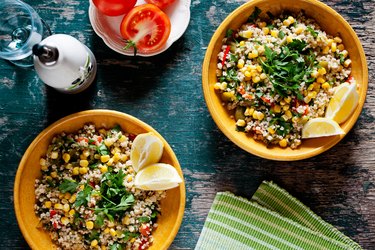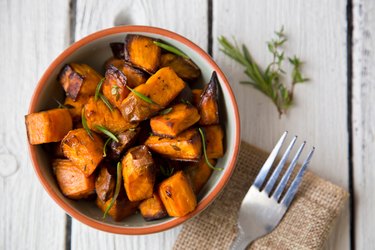
Carbohydrates have a serious image problem. The macronutrient gets blamed for weight gain, so a good number of diet plans either severely restrict or cut them out entirely. However, carbohydrates serve as your body's main source of energy, so without eating enough, you could feel lethargic. Luckily, there are plenty of good carbohydrates out there that can—and should—be part of a well-balanced, healthy diet.
Complex Carbs vs. Simple Carbs
Video of the Day
A carbohydrate's label of "complex" or "simple" is a scientific term that refers to its chemical structure, but it also indicates how quickly the carbohydrate is digested and its sugar absorbed into your bloodstream. It's not always easy to figure out which carbohydrates are simple and which are complex.
Video of the Day
The types of "bad" simple carbohydrates that you want to avoid include raw sugar (both white and brown) in items such as soda, baked goods or sugary breakfast cereals, as well as high-fructose corn syrup—which is often added to processed goods—and fruit juice concentrates.
Complex carbohydrates are typically higher in fiber, an indigestible carbohydrate that lessens the carb's impact on your blood sugar. "Good" complex carbohydrates include whole grains, legumes and starchy vegetables.
Whole Grains
When it comes to low-carb diets, whole grains such as brown rice, oats and whole-wheat pasta are typically the first food group to get eliminated. However, whole grains are good carbohydrates, providing a bounty of vitamins and minerals. A study published in BMC Medicine in 2015 looked at more than 360,000 people over a 14-year period, determining that people who ate the most whole grains had a 17 percent decreased risk of death from all causes, including diabetes and cancer, compared with those who ate the least amount of whole grains. The category of whole grains includes, among others:
Barley: 28 grams of carbohydrates per 100 grams of cooked barley
Brown rice: 25 grams of carbohydrates per 100 grams of cooked rice
Oats: 12 grams of carbohydrates per 100 grams of cooked regular oats
Quinoa: 21 grams of carbohydrates per 100 grams of cooked quinoa
Whole wheat: Carbohydrate content will vary based on product, such as whole-grain bread or whole-wheat pasta
Make sure you're picking whole-grain items rather than the refined versions, which aren't as nutritious because the bran and germ have been removed. Even enriched wheat products, which have had some key nutrients added back to the food, aren't as healthy as simply eating the whole-wheat product. For example, choose brown rice over white, steel-cut oats over instant and whole-grain pasta instead of enriched white pasta.
Read More: List of Complex Carbohydrates
Legumes
Legumes, such as beans, lentils and peas, contain both carbohydrates — much of it in the form of fiber — and protein with a minimal amount of fat. The health benefits of legumes are significant, including B vitamins, iron, folate, calcium, potassium, phosphorus and zinc. Smart legume choices include:
Chickpeas: 27 grams of carbohydrates per 100 grams of beans
Edamame: 8.9 grams of carbohydrates per 100 grams of soybeans
Kidney beans: 22.8 grams of carbohydrates per 100 grams of beans
Lentils: 20 grams of carbohydrates per 100 grams of lentils
Peas: 14 grams of carbohydrates per 100 grams of peas

Read More: A Complete Guide to Complex Carbohydrates
Root Vegetables
All vegetables have some carbohydrates, but starchy vegetables such as root veggies and winter squashes have the most. However, these vegetables also have a bevy of micronutrients and other beneficial compounds, such as antioxidants like polyphenols and flavonoids, as well as fiber.
As root vegetables grow downward into the soil, they absorb the vitamins and minerals in the ground — making them incredibly nutritious as a source of good carbohydrates. Root vegetable options that are good carbohydrates include:
Beets: 10 grams of carbohydrates per 100 grams of cooked beets
Carrots: 9.6 grams of carbohydrates per 100 grams of raw carrots
Russet potatoes: 21 grams of carbohydrates per 100 grams of cooked potatoes
Rutabaga: 6.8 grams of carbohydrates per 100 grams of cooked vegetable
Sweet potatoes: 17 grams of carbohydrates per 100 grams of cooked potatoes
Winter Squashes
Another type of starchy vegetables, winter squashes are fairly high in carbohydrates but also low in calories and rich in nutrients. The interior flesh of winter squash is colorful, ranging from yellow to orange, which indicates the presence of alpha- and beta-carotene, both precursors to vitamin A. Varieties of winter squash also contain lutein and zeaxanthin, carotenoid compounds that help protect your vision.
Include these winter squashes, which are good carbohydrates, in your diet regularly:
Acorn squash: 15 grams of carbohydrates per 100 grams of cooked squash
Butternut squash: 10.5 grams of carbohydrates per 100 grams of cooked squash
Hubbard squash: 10.8 grams of carbohydrates per 100 grams of cooked squash
Pumpkin: 8 grams of carbohydrates per 100 grams of cooked squash
Spaghetti squash: 6.5 grams of carbohydrates per 100 grams of cooked squash
Fruits
Technically speaking, the sugar in fruit — fructose — is a simple carbohydrate. However, most fruits have a good amount of fiber, a complex carbohydrate, that tempers the effect of the fructose and slows down its absorption into the bloodstream.
Even if you're watching your carb intake for health purposes, you can still include a number of lower-carb fruits in your daily diet, such as:
Cantaloupe: 8.16 grams of carbohydrates per 100 grams of fruit
Honeydew melon: 9.09 grams of carbohydrates per 100 grams of fruit
Peaches: 9.54 grams of carbohydrates per 100 grams of fruit
Strawberries: 7.68 grams of carbohydrates per 100 grams of fruit
Watermelon: 7.55 grams of carbohydrates per 100 grams of fruit
- Harvard T.H. Chan School of Public Health: Fiber
- BMC Medicine: Consumption of whole grains and cereal fiber and total and cause-specific mortality: prospective analysis of 367,442 individuals
- MedlinePlus: Healthy food trends - beans and legumes
- Berkeley Wellness: Roots and Tubers: Nature’s Buried Treasures
- MedlinePlus: Simple Carbohydrates
- MedlinePlus: Complex Carbohydrates
- American Diabetes Association: Fruits
- Harvard T.H. Chan School of Public Health: Antioxidants: Beyond the Hype
- Tufts University: Beyond Pumpkin: Harvest the Health Benefits of Winter Squash